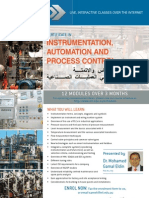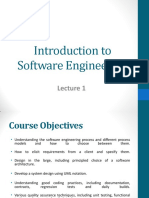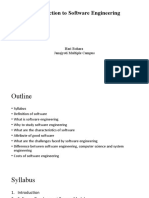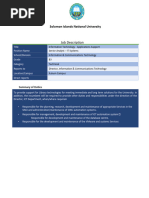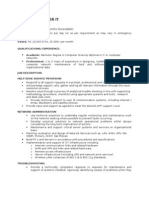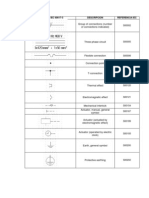Program Electrical Engineering
Uploaded by
lex_of_rocknetProgram Electrical Engineering
Uploaded by
lex_of_rocknetElectrical Engineering
Program-specifc competencies
What competencies do electrical engineering students gain?
Competencies are the skills, knowledge and attributes gained through every work, educational, volunteer
and life experience. UVic students in the Electrical Engineering program develop the following program-
specifc competencies.
Develops the following competencies specifc to the Faculty of Engineering:
Professional practice
Behaves in accordance with the standards and code of ethics of the Association of Professional Engineers and
Geoscientists of British Columbia (APEGBC)
Reliability, safety and failure analysis
Develops systems that are reliable and efective by mitigating risk and reducing failure
Prioritizes the safety, health and welfare of public and environmental protection
Promotes health and safety within the workplace
Undertakes and is responsible for professional assignments only when qualifed
Maintains confdentiality and avoids a confict of interest
Keeps informed to maintain competence
Acts with fairness, courtesy and good faith towards clients, colleagues and others
Extends public knowledge and appreciation of engineering
Maintains an awareness of the quality assurance standards and testing procedures
Ensures that systems or components perform their required function for the required duration under
the stated conditions
Maintains a current knowledge and awareness of requisite safety standards
Understands the consequences of failure and reduces their impact
Establishes the mean time between failures when assessing reliability
Design
Gathers requirements, develops models and creates prototypes in a timely and efective manner to
increase a projects safety and success
Gathers full requirements for a project
Understands the clients needs
Models a solution using the appropriate tools
Relates and justifes the design process to the client
Implements designs that are safe and efective
Demonstrates awareness of how the design integrates into its environment
Engineering tools
Uses a broad range of Engineering tools, applications and software.
Designs equipment and systems using a variety of software packages
Simulates mechanical and electronic systems using the appropriate tools
Analyses systems, equipment and data using the correct tools
Operates mechanical equipment in a lab or workshop safely and efectively
Uses electronics and electrical equipment in a careful and accurate manner
Develops software and scripts in a variety of environments and languages
Uses computer software and systems in an appropriate manner
Understands database concepts and usage and uses them efectively
Researches and recommends new tools where existing tools are inadequate
Chooses tools based on their comparative strengths and weaknesses
Engineering knowledge
Understands the broad scope of disciplines that support engineering theory and practice
Demonstrates knowledge of the mathematical fundamentals of engineering
Applies the correct statistical methods to analyze and investigate data
Understands the supporting natural sciences for their discipline of engineering
Maintains a comprehensive knowledge of the engineering fundamentals
Demonstrates an understanding of engineering economics
Comprehends how engineering specifcs integrate into a larger project
Studies companion subjects to aid a projects success
Develops the following competencies specifc to the Electrical Engineering program:
Networks, hardware and communications
Understands computer networking principles and engineering
Understands layered network architecture
Uses diferent digital communication networks to transmit data
Works with LANs and WANs
Applies diferent network protocols at diferent layers
Protects networks from unauthorized access using the appropriate policies in conjunction with the
underlying computer network infrastructure
Identifes mobile wireless communications techniques and issues afecting multimedia quality of
service
Implements diferent types of buses, interrupts, families of processors and instruction sets
Software development, practice and theory
Employs knowledge of software life cycles and developmental phases
Works within the diferent software development lifecycle stages
Takes business, product and process requirements into consideration
Applies diferent software development methodologies
Implements process improvement models, such as ISO 9000
Solves software development problems using formal methods
Considers software evolution issues during development
UVic Co-op and Career worked with the UVic Faculty of Engineering of to develop this competency document.
Computer hardware and systems
Demonstrates knowledge of the architecture of computer systems and the interrelationship between the OS and the
architecture
Utilizes the necessary tools to improve system performance
Understands the transfer of information from one system component to another
Compares performance of similar systems using common metrics
Identifes the optimal system for given problem
Works with diferent CPU architectures
Uses diferent operating systems
Utilizes diferent memory management methods
Computer information processing and algorithms
Understands the theoretical foundations of computer science and the practice of abstracting known methods to
new problems
Designs automated software test tools
Displays an ability to manipulate information
Creates solutions from user specifcations, given known system constraints
Optimizes solutions to improve performance using coding best practices
Acknowledges the practical limits of a system for problem solving
Discover career resources and support at www.uvic.ca/coopandcareer
Apply for jobs and more at learninginmotion.uvic.ca
You might also like
- Hourglass Workout Program by Luisagiuliet 276% (21)Hourglass Workout Program by Luisagiuliet 251 pages
- The Hold Me Tight Workbook - Dr. Sue Johnson100% (16)The Hold Me Tight Workbook - Dr. Sue Johnson187 pages
- Read People Like A Book by Patrick King-Edited62% (65)Read People Like A Book by Patrick King-Edited12 pages
- Livingood, Blake - Livingood Daily Your 21-Day Guide To Experience Real Health77% (13)Livingood, Blake - Livingood Daily Your 21-Day Guide To Experience Real Health260 pages
- COSMIC CONSCIOUSNESS OF HUMANITY - PROBLEMS OF NEW COSMOGONY (V.P.Kaznacheev,. Л. V. Trofimov.)94% (212)COSMIC CONSCIOUSNESS OF HUMANITY - PROBLEMS OF NEW COSMOGONY (V.P.Kaznacheev,. Л. V. Trofimov.)212 pages
- Donald Trump & Jeffrey Epstein Rape Lawsuit and Affidavits83% (1016)Donald Trump & Jeffrey Epstein Rape Lawsuit and Affidavits13 pages
- The 36 Questions That Lead To Love - The New York Times94% (34)The 36 Questions That Lead To Love - The New York Times3 pages
- The 36 Questions That Lead To Love - The New York Times95% (21)The 36 Questions That Lead To Love - The New York Times3 pages
- Jeffrey Epstein39s Little Black Book Unredacted PDF75% (12)Jeffrey Epstein39s Little Black Book Unredacted PDF95 pages
- Low-Current Systems Engineer’S Technical Handbook: A Guide to Design and SupervisionFrom EverandLow-Current Systems Engineer’S Technical Handbook: A Guide to Design and Supervision5/5 (2)
- The 4 Hour Workweek, Expanded and Updated by Timothy Ferriss - Excerpt23% (954)The 4 Hour Workweek, Expanded and Updated by Timothy Ferriss - Excerpt38 pages
- Architecture: Technical Competency List Civil EngineeringNo ratings yetArchitecture: Technical Competency List Civil Engineering12 pages
- Problem Sheet - 1: Figure 1. Conduction Band Figure 2. Valance Band0% (1)Problem Sheet - 1: Figure 1. Conduction Band Figure 2. Valance Band2 pages
- Chapter 1 - Introduction To Software EngineeringNo ratings yetChapter 1 - Introduction To Software Engineering28 pages
- Dept. of Computer Science Faculty of Science and TechnologyNo ratings yetDept. of Computer Science Faculty of Science and Technology28 pages
- 4 25655 SE291 2020 1 2 1 Lecture 1 - Introduction To Software EngineeringNo ratings yet4 25655 SE291 2020 1 2 1 Lecture 1 - Introduction To Software Engineering27 pages
- Introduction To Software Engineering: Hari Bohara Janajyoti Multiple CampusNo ratings yetIntroduction To Software Engineering: Hari Bohara Janajyoti Multiple Campus13 pages
- 1522229440intro To Software EngineeringNo ratings yet1522229440intro To Software Engineering25 pages
- Software Engineering 18CSC24: T.Suvarna Kumari Assistant Professor Dept. of CSENo ratings yetSoftware Engineering 18CSC24: T.Suvarna Kumari Assistant Professor Dept. of CSE12 pages
- HR 242 2021 JD - Senior Analyst - IT SystemsNo ratings yetHR 242 2021 JD - Senior Analyst - IT Systems5 pages
- JD - Lead Engineer - Systems Engineering (R3709501)No ratings yetJD - Lead Engineer - Systems Engineering (R3709501)4 pages
- Unit 2 Software Requirement EngineeringNo ratings yetUnit 2 Software Requirement Engineering45 pages
- Standards and Guidelines For The Practice of Electronics Engineers in The PhilippinesNo ratings yetStandards and Guidelines For The Practice of Electronics Engineers in The Philippines15 pages
- Software Engineering-week1-1-IntroductionNo ratings yetSoftware Engineering-week1-1-Introduction20 pages
- Unit I: Generic - Developed To Be Sold To A Range of Different Customers E.G. PC Software Such AsNo ratings yetUnit I: Generic - Developed To Be Sold To A Range of Different Customers E.G. PC Software Such As26 pages
- Engineering Design Methods and Tools: Sahar Idrees100% (1)Engineering Design Methods and Tools: Sahar Idrees14 pages
- 1TXH000247C0201 OPR Lightning Protection SystemsNo ratings yet1TXH000247C0201 OPR Lightning Protection Systems52 pages
- Industrial Profile: Hutti Gold Mines Company LimitedNo ratings yetIndustrial Profile: Hutti Gold Mines Company Limited78 pages
- Mina Petrila-Spatiu Exterior 2 - 14 03 2024-ModelNo ratings yetMina Petrila-Spatiu Exterior 2 - 14 03 2024-Model1 page
- Infection Prevention and Control (IPC) For COVID-19 VirusNo ratings yetInfection Prevention and Control (IPC) For COVID-19 Virus21 pages
- Reflective Practice Using Assessment DataNo ratings yetReflective Practice Using Assessment Data58 pages
- 24by09in00002376 - Sky Ventureszdup - 27-07-2024No ratings yet24by09in00002376 - Sky Ventureszdup - 27-07-20242 pages
- CV For Road Safety Specialist - PDF - CompressedNo ratings yetCV For Road Safety Specialist - PDF - Compressed8 pages

































